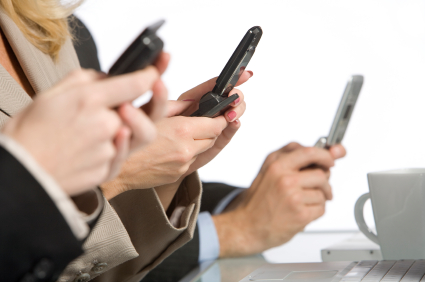
You are holding a meeting with 8 people in the room. However, only 3 are paying attention and contributing.
The others are working on their laptops. Checking email. Texting friends. Or who knows what else.
Does this sound familiar? Is this your meeting?
Too Many Distractions
These days it seems that there are way too many distractions during meetings. I am not sure if any meeting gets completed without some sort of interruption.
Laptops. Email. Text Messages. Ringing cell phones.
Some people are blatant. Checking their email. Texting. Answering phone calls. Even updating Facebook.
It seems that any meeting etiquette or efficiency has been long forgotten.
In a meeting recently, a manager walked in, sat down their laptop, and rhetorically asked, “Is it OK with everyone if I work straight through this meeting? I have lots to do.”
Um, well, we all do. That is why we need to hold an efficient meeting.
Beyond the Topless Meeting
A few years ago, the term “topless meeting” was coined. It referred to meetings at which laptops were not allowed. The idea was to keep people from doing other work while in a meeting. Technology has evolved since then with smartphones, social media, and more. Today we have even more distractions.
So, I propose that for a truly efficient meeting… you have to disarm your meetings.
Here are a few tips to disarm the distractions that typically interrupt meetings. After all, meetings should be participatory events. Otherwise, there is no reason to take up people’s time.
How to Disarm Your Meeting Distractions:
- Set Rules in Advance – Setting expectations is key to getting your team members on board. It also can prevent you having to call someone out during the meeting. Let them know the rules in advance. What is acceptable and not acceptable meeting behavior.
- Right To Decline – One reason that people do other work during meetings is that they feel obligated to attend even when they have something more important they should be doing. If you empower your people with the “Right to Decline,” they can make the right choice about whether they should attend a meeting.
- Disarm Participants – Have all participants “disarm.” Laptops, cell phones, and any other tech weapons. Leave them at the door or place them out of reach. If you want to really have a productive meeting, only allow participants to show up with paper and pen.
- Do Not Allow Latecomers – If someone is more that a few minutes late, they should not be allowed to join the conference. Have you ever had someone join at the 30 minute point and the entire meeting starts over?
- No Calls During the Meeting – When did it become acceptable to answer a cell phone call right “in” the meeting. If you must take a call, exit the room. No exceptions.
- Ask Those Working on Other Things to Leave – Stand firm with the attendees. If someone is doing something else on their laptop, then they should be asked to leave. If it is that important, (and it could be!), then it deserves to be worked on elsewhere.
These meeting tips seem simple. Yet, they are not followed in most business environments. These rules should apply from the most senior to the junior person in the room. It is not uncommon for executives to “pull rank” and pretend the rules do not apply to them.
By disarming the common distractions, your meetings will become more productive, and even take less time. Additionally, your team members will remain more engaged and more likely to contribute.
How do you keep people engaged in your meetings? What distractions do you have to deal with?
Related Posts:
7 Rules For Being “In The Meeting”
 I am the author of Time Management Ninja and help individuals and companies reclaim their time to be more productive. As well, I am the author of the book
I am the author of Time Management Ninja and help individuals and companies reclaim their time to be more productive. As well, I am the author of the book 

Great summary on distractions and how to deal with them. My pet hate is the Blackberry as people think they can check them under the table without being seen. I have a groundrule – mobile phones off, Blackberrys off and laptops closed. I also make it clear when we'll be having breaks so that everyone knows how long their phone will be off for.
i can live with mobile phones and blackberry devices being switched off, but what is the point of nice note taking tools (like onenote) if I am not allowed to use my laptop during a meeting.
allthough I do agree with the general tendancy of tis article, I do think that one shouldbe careful with simply “disarming”… I know quite some people who are perfectly capable of using technology in a polite, productive and efficient manner, even during meetings.